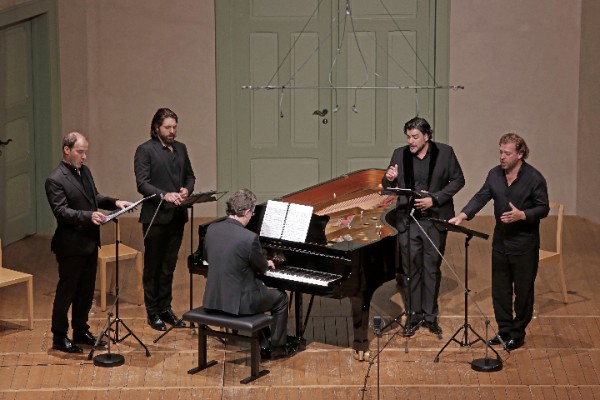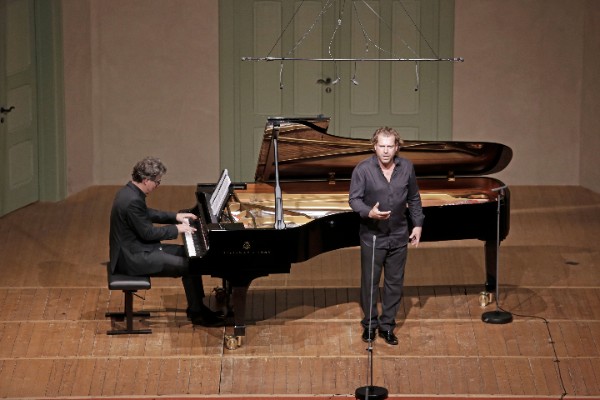When one thinks of a ‘music festival’, we might be transported anywhere from an Ancient Roman Bacchanale, to a coliseum-style rock music arena, a city made in a Nevada desert, anarchist-hippie techno raves throughout Continental Europe, or the elite preserves of Salzburg and Bayreuth. For thousands of years, people have always found reasons to come together and celebrate – so it takes an exceptionally creative mind to come up with something unique amongst the variety on offer; which is exactly the position Wonderfeel occupies. A classical music festival in the heart of a Dutch nature reserve, Wonderfeel is entering its 11th year in 2025, after spending the past decade offering classical music to tens of thousands of new listeners in a pop-festival atmosphere. Co-founder, and CEO Tamar Brüggemann talks about her work in the next edition of The Atypical Artist Spotlight Series!
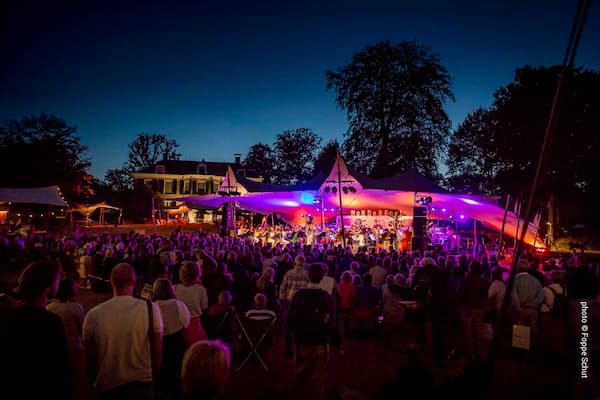
Firstly, a difficult anthropological and philosophical one – why do you think humans across the globe have always wanted (or even needed) the ‘festival’ as a concept? How does attending a festival in 2025 connect us with our ancestors in 524BC?
I think it has everything to do with our human desire to celebrate life’s milestones and joys together. There is something deeply fulfilling about coming together with others in a shared experience. A party on your own is not a party – it is the collective energy, the connection, a sense of belonging that make it meaningful. At its core, I don’t think much has changed between organising Wonderfeel today and the festivals held thousands of years ago to celebrate a harvest or honour a deity. It’s still about creating a space for joy, reflection, gratitude and maybe even transformation.
You came to this world via the Early Music scene through your work with the Utrecht Early Music Festival and Holland Baroque: in recent decades, it seems like purveyors of early music have enjoyed a remarkable freedom, both in terms of musicality and out-of-the-box productions. Why do you think this is the case – e.g. is it because the music itself lends itself to freedom (by virtue of the improvisatory nature of the music), that it had to be entrepreneurial to find space amongst the more viable classical- and romantic-era styles in large concert halls, or that simply the creatives in the early music scene are a little more bonkers than the average musician?
Haha, love this question. I think a mix of factors is at play. Early music used to be rigidly focused on historical accuracy, but over time, the focus has shifted from authenticity of the score toward authenticity of the performer. This evolution, perhaps as a reaction to past rigidity, has allowed for more creativity and individuality. The early music mission of making historically informed performance visible and valued has largely succeeded, opening the door to bold experimentation.
Yes, early-music performers are often adventurous – inquisitive, risk-taking, and self-reliant – you could even call it bonkers. But what really stands out is the way this spirit has influenced (and been influenced by) the broader ensemble culture in the Netherlands. Dutch ensembles are bold and out-of-the-box, unafraid to break conventions or expectations. This unique strength stems from a funding infrastructure established in the 1960s and 1970s and the inherently collaborative and flexible nature of smaller ensembles. These groups thrive on quick communication, shared decision-making, and the active contributions of every musician, making them fertile ground for truly innovative performances.
More broadly, classical music has been demystified. The gap between performer and audience is shrinking, with musicians becoming storytellers and creators of experiences. Spaces – physical and conceptual – are being sought after or designed to enhance this connection, which is exactly what Wonderfeel aims to do: present classical music, including early music, in a way that feels accessible, personal, and alive.
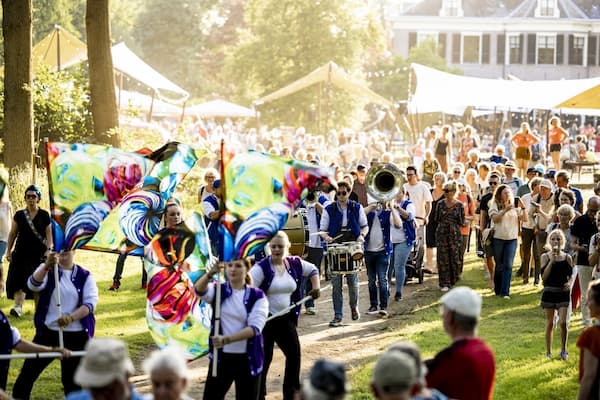
What were the main barriers you encountered when launching Wonderfeel a decade ago – who did you have to convince, who did you have trouble convincing, how did you even manage to make it happen?
The biggest obstacle was and still is: myself. ‘All that confident lack of confidence, / Which is what making art is really like. / The dark blood zoning forward and backward / In the brain, the heart like grass in a bowl, / And the burning horizon’s sharp swagger / All of it part physics, part faith, part void,’ as Rowan Ricardo Phillips puts it in his poem The Triumph of Song. I think these words resonate not only with the process of making art but also with enabling it as a festival maker, and perhaps even with life itself. Of course, money, timing, location, and especially the people you collaborate with are crucial, but if you don’t push past yourself, your own boundaries, nothing will happen. Fortunately, thirteen years ago, I was very much driven to push myself and get Wonderfeel off the ground together with Georges Mutsaerts, initiator and co-founder of Wonderfeel. If I had known everything I know now – from summer storms to heatwaves, from legal battles to the ongoing struggle for funding – I don’t think I would have found the courage to begin. That said, I would never want to miss out on the wonderful people I have (had) the privilege of working with.
Does Wonderfeel as a concept work as a gateway for new audiences, or is it more designed to cater for audiences who already engage with classical music? For the latter, do you think the experience you offer expands their ideas of how classical music can be enjoyed?
Wonderfeel is really all about the audience. Their musical experience is our top priority. The ‘snack formula’ from pop festivals works just as well for classical music, which makes the festival appealing to a broader crowd, not just classical music fans. In 2024, our 9,600-strong audience included 1,200 kids. According to our surveys, 85% of attendees visit more than five concerts a day, totaling over 48,000 concert visits. What’s interesting is that 61% of our adult visitors hear music they would normally never or rarely listen to. 53% never visit a festival but were drawn in by Wonderfeel’s concept. Over 11% never attend a classical concert. And 74% feel that Wonderfeel makes classical music more accessible. And about 90% says Wonderfeel made them feel more fulfilled (‘gelukkiger’ in Dutch). And I think the key to this experience lies in the close connection between performers and the audience, along with the relaxed, welcoming vibe of the festival.
Wonderfeel After-Video 2023
What about the musicians? How do they enjoy being sent out into the wild and having new performance experiences – do you often receive positive feedback from them, or signs that the experience has influenced them to change their own creative practices?
A few years ago, the wonderful pianist Pavel Kolesnikov wrote: ‘Summer festivals are risky… All the terrible stuff: open air, minimal rehearsals, thousands of people, food, hippies, and a hundred concerts happening in 3 days – a perfect horror movie for me. I was wrong. It is a simple and reliable model of paradise.’ Cellist Ella van Poucke shared in one of our newspapers: ‘You feel the reactions of the audience much better than in a normal concert hall.’ Countertenor Maarten Engeltjes said once in an interview, and I’m paraphrasing: ‘The setting sun and the smell of grass create an atmosphere you won’t find anywhere else. Classical music must be taken out of the norm of perfection. The experience is also important.’
And an encouraging reflection from poet Joost Oomen about Wonderfeel: ‘It’s always a pleasure when a big music festival understands that it should also involve its little brother, poetry. And it’s especially heartening when that’s done by a festival that treasures artistic quality above all, not just selling beer. All the poets who performed at Wonderfeel 2024 can attest that the audience was already predisposed to enjoy the poetry, not distracted or restless, but genuinely interested. They didn’t come to deal with a hangover; they came to see a poet they had read before or to discover a new one. That’s very different from many other festivals, and it was a warm bath to discover at Wonderfeel that it can be done differently.’
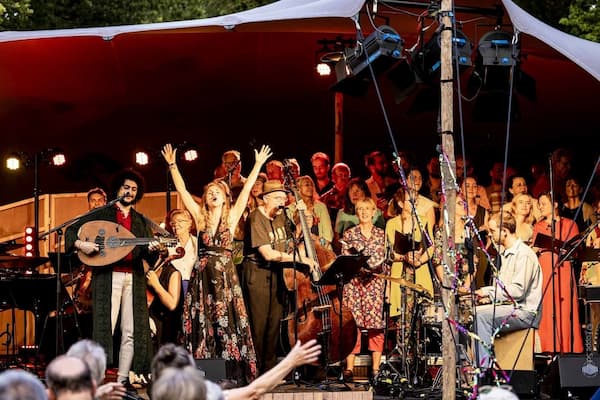
What is the necessity of developing new formats for classical music enjoyment? Do you think they serve to support the traditional methods of listening (namely, concert halls), or do you think a wider range of options could diversify the listener-base and boost the entire industry?
I believe that developing new formats for classical music is always necessary, perhaps now more than ever. I admire it when artists use their power and platforms to address pressing matters – whether social, environmental, or otherwise – and offer more than just a performance by sharing a story. While much of the classical music repertoire leaves room for personal interpretation, this openness can be a strength, allowing musicians to highlight connections that resonate deeply with them and their audiences. We may not always realise how much the location itself influences the narrative. For some productions, it’s clear that the traditional concert hall may no longer be the ideal setting to tell their story. These works seek out spaces that feel less conventionally loaded or carry a different kind of resonance.
I hope the Wonderfeel format – inspired by pop festivals – will inspire others in the classical music world, as it offers many advantages. One key benefit is artistic freedom: the sale of day tickets means we don’t need to sell tickets for individual programs, removing the need to balance potential ‘bleeders’ with ‘cash cows’. We see our role in the sector as using Wonderfeel to focus on artistic choices that complement – and are often too risky for – the seasonal programming of concert halls. In short, we don’t prioritize the classical canon in our programming, and with full conviction, we offer a platform and development opportunities for young creatives, lesser-known, and underrepresented musicians and composers.
That said, I still deeply enjoy listening to pieces like Messiaen’s Visions de l’Amen or Bach’s Brandenburg Concertos in a concert hall. Both formats can coexist, but diversifying how classical music is presented can certainly help expand its audience and give the entire industry a sense of urgency and relevance. Moreover, within concert halls, many venues are currently reinventing themselves – organisations like Southbank in London or De Doelen in Rotterdam can share more about that transformation.
When curating: is there a necessity to bring musicians who are open-minded to an event like Wonderfeel, because otherwise you risk transporting the stuffy nature of conservative concerts into your event? Have you noticed a difference between artists who ‘get it’ and those who don’t, or do you find that the setting inspires every musician to approach their performances in a new way?
I believe that as long as musicians have a spark in their eyes, know the story they want to tell, and approach their craft with integrity and energy, they are welcome at Wonderfeel. There’s no such thing as ‘the stuffy nature of conservative concerts.’ What does exist are musicians who, perhaps, don’t (yet) have the skills or the narrative power to make the music truly come alive. That’s where festivals and concert halls play a vital role: we need to create spaces that support younger artists, giving them the opportunities they need to grow and flourish.
Many classical music organisations are reluctantly and belatedly realising that things such as sustainability and DEI are requirements in the 21st century, with the terms being thrown around like buzzwords rather than core beliefs and actual mission statements. Festivals Forest seems to be a genuine and authentic response to the climate issues – namely by planting a forest in Iceland. Why did you start this work, what is the carbon footprint of a festival, and how do you think other festivals can improve their responsibilities?
The European Festivals Forest – founded in 2021 – is a genuine response to the climate crisis, with our planting initiative in Iceland aiming to offset the environmental impact of festivals. The idea was born from my co-founder, Peter Florence, who suggested a simple yet effective way to help festival audiences offset the carbon footprint of their favorite event: by purchasing a tree for just €2. The carbon footprint of a festival can be significant, but by adopting sustainable practices – such as using local resources, reducing waste, and promoting eco-friendly travel options – festivals can and are minimizing their impact. Since it’s impossible to fully eliminate CO2 emissions, the European Festivals Forest helps to close the loop, contributing to our collective responsibility toward the planet.
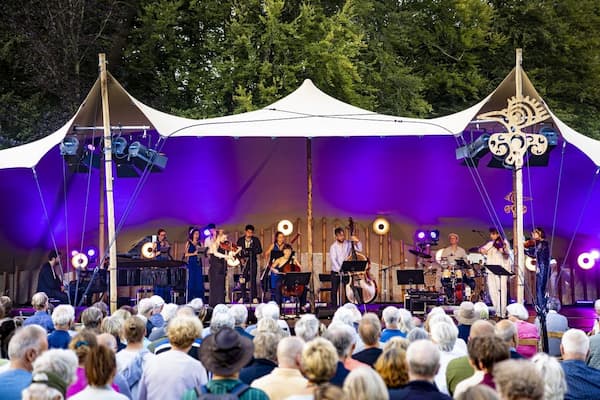
Large productions are typically the most thankless type of work, with festivals undoubtedly the largest of these undertakings – for all the hundreds of hours of work throughout the year (in which adequate remuneration for energy into dollars is rarely achieved), they’re 100% a labour of love. What is it about Wonderfeel that keeps you coming back year after year?
Yes, organising a festival is an enormous amount of work, and no, we are not getting rich from it, but the energy and excitement of seeing it all come together makes it worth it. The magic comes from the incredible people I work with – my colleagues, the crew, the artists, volunteers, suppliers – and from the unique atmosphere we create. There’s nothing like the joy of sharing that with an audience that’s open to experiencing classical music in a new way. And I hope Interlude readers will want to join the joy on 4, 5, and 6 July on the Groeneveld estate in Baarn, right in the middle of the Netherlands!
What is the potential of Wonderfeel – what is the utopia you would wish to see in the future? A year-round performance village, a movement that inspires creation of new works, a Bayreuth-for-the-new-generation?
This is a big question that sometimes gets buried under the daily challenges, but as I sit here on this quiet Sunday morning at the beginning of a new year, trying to look ahead at the next decade, I would say that the potential of Wonderfeel lies in continuing to innovate and expand what we have started. I would love to see us grow into a year-round initiative, with yearly events like WinterWonderfeel and even spin-offs like Wonderfeel Cyprus already on the horizon. This would allow us to deepen the impact of what we’re doing – bringing classical music to new places, supporting emerging artists across Europe, and building diverse communities around it.
At the end of the day, it’s about making sure classical music stays part of our current world and reflects the here and now. We want to keep it fresh, keep it fun, and keep offering spaces where people can discover new things, whether that’s through unexpected performances, new collaborations, or just experiencing the music in a different setting.
Canto in Flow (Yoga and Music)
What is the funniest thing you’ve witnessed at Wonderfeel?
Many events that seemed like disasters at the time are now things we can laugh about. Take the performance by Le Consort with singer Adèle Charvet, for example. A gust of wind blew all the music away – despite our best efforts with pegs – and they just kept playing, while volunteers frantically tried to gather up all the scattered sheets, earning the admiration and loud applause of the audience. Or the other end of the spectrum: when the pump for the main toilets stopped working, and colleagues had to take turns manually flushing the system. We called them the ‘poop shifts,’ and every so often, someone had to step in and push a button to keep things flowing…
What is the most profound experience you’ve encountered at Wonderfeel?
One of the most profound experiences I have encountered at Wonderfeel happened when PRJCT Amsterdam, with Elizabeth Hetherington and Maarten Engeltjes, performed Pergolesi’s Stabat Mater in pouring rain. The entire audience huddled together under umbrellas, creating a magical moment of shared intimacy. Another unforgettable moment was when we celebrated farmer Kemp and his family, who had allowed us to use their meadow for parking for years. We put together a special arrangement of film music they love, and the entire Wonderfeel audience applauded for them. Seeing their faces light up still gives me a deep sense of joy.
I also deeply cherish the moments that happen backstage – like seeing writer Kader Abdolah play table tennis, or watching artists like Reinbert de Leeuw, Schumann Quartet, Aynur Doğan, Mari Samuelsen, and The Kanneh-Masons share the same backstage meal as the crew and volunteers. Or that moment seeing the amazement on Terry Riley’s face when he heard a bunch of volunteers singing Fauré’s Cantique de Jean Racine during dinner.
I think what moves me the most is the sense of community that runs through the heart of Wonderfeel, making me really happy and proud.
For more of the best in classical music, sign up for our E-Newsletter

